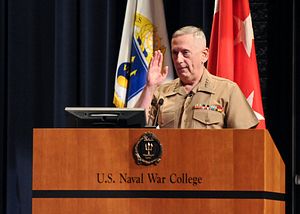The Rebalance author Mercy Kuo regularly engages subject-matter experts, policy practitioners, and strategic thinkers across the globe for their diverse insights into the U.S. rebalance to Asia. This conversation with Dr. Kori Schake – Research Fellow at the Hoover Institution and editor, with General James Mattis, of the book Warriors and Citizens: American Views of Our Military – is the 75th in “The Rebalance Insight Series.”
What will likely be the organizing principles of President-elect Trump’s national security team?
That’s actually really hard to answer right now. As Thomas Wright argued last winter, Donald Trump has held consistent beliefs since the 1980s about America’s allies taking advantage of us and trade being detrimental to jobs. And his senior White House staff reflect those positions, too. But he’s also appointing cabinet members whose views are much more congenial and dealing with a Congress whose views are more traditionally conservative, favoring free trade and supporting alliances as a great advantage for America.
And how might these principles operate in the Trump administration’s civil-military leadership dynamic?
I think the more interesting dynamic in a Trump administration will be the White House staff vs. the Cabinet departments. The people closest to the president, both in terms of perspective about the world and because they were major supporters early in the campaign, are staffing him in the White House. The Cabinet secretaries are from outside his political circle and much more establishment figures. While two of them are indeed veterans, they’re also two of the most distinguished public servants — neither participated in the political campaign nor endorsed candidates.
How might the leadership style and worldview of General James Mattis, Trump’s nominee for secretary of defense, shape U.S. security strategy in Asia?
Jim Mattis is a great American and a devoted friend to America’s allies. But I think it’s wrong to place too much responsibility on him for U.S. security strategy in Asia. Those are principally decisions for the president, the national security advisor, and the secretary of state. The statutory responsibilities of the defense secretary are to ensure the United States has military forces capable of defending the nation and its interests. Those of us who breathed sighs of relief when Jim was nominated need to be careful not to expect him to be our savior in an administration where foreign policy is principally other peoples’ job.
With Islamic State, Iran, and Russia as pressing priorities for the Trump presidency, how might U.S. Asia policy, specifically the rebalance to Asia, change?
I’m skeptical President Trump will reflexively continue any of President Obama’s policies, including the “pivot to Asia.” And during the campaign candidate Trump talked an awful lot of nonsense about America’s role in the world. But it wouldn’t be the first time in our history that a candidate’s perspective changed substantially once they got elected and became responsible for the security and prosperity of our country. I would just recall that candidate Obama campaigned against NAFTA [North America Free Trade Agreement] before becoming the president who negotiated TPP [Trans-Pacific Partnership], and campaigned against President George W. Bush’s counterterrorism policies before becoming the president that continued almost all of those policies.
What key decision-making indicators would signal consequential shifts in the new U.S. administration’s foreign policy objectives?
Trade will be the canary in the coal mine, I think. TPP is not only a mutually-beneficial trade deal, but also a huge foreign policy achievement, allowing the U.S. and its allies to set the terms of trade on a scale that will lock in for our country’s significant advantages. President-elect Trump claims he will repudiate it early, and if he does, then we’ll be in for a wild ride on foreign policy because so many other things will be brought into question.

































